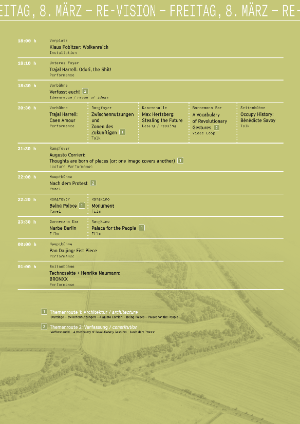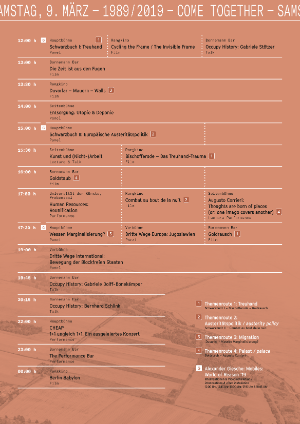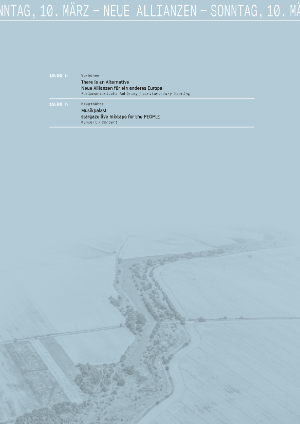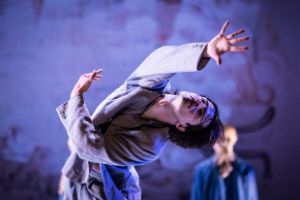
Art, discourse & parliament
Palast der Republik
Day 1: Re-Vision
with Almuth Berger, Tatjana Böhm, Susan Buck-Morss, Boris Buden, Augusto Corrieri, Bernd Gehrke, Trajal Harrell, Max Hertzberg, Sanja Horvatinčić, Gal Kirn, Kerstin Meyer, Technosekte + Henrike Naumann, Ana Ofak, Pan Daijing, Elske Rosenfeld, Bénédicte Savoy, Bernhard Schlink
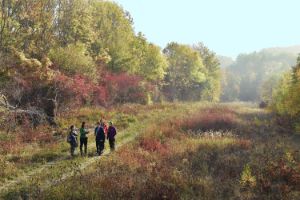
The Green Belt © picture alliance/dpa, photo: Martin Schutt
On the opening night, we want to resurrect the Palast der Republik without glorifying it. A revue of ideas reminds us of the progressive impulses of the new constitution that was developed at the GDR’s Central Round Table in the winter of 1989/90.
Many protagonists of the rebuilding of the Schloss, as the architect and curator Philipp Oswalt recalls, were East Germans, many critics of the demolition of the Palast der Republik were West Germans. This building, which existed for less than 14 years, combined political representation and entertainment, culture and international encounters. According to its function, the Palast was part of the tradition of so-called “Volkshäuser”. This vision, however, did not become reality until the final phase of the GDR, when the people protested outside its doors and soon afterwards, a freely elected parliament debated the demise of the country inside the building. On the opening day, we want to recall the new draft constitution that was commissioned here as a foundation for the reunification negotiations as well as the work done by the Round Tables of this era, where a different kind of society was envisioned and initiated.
18:00 h, Vorplatz
ca. 20 min
Klaus Pobitzer
Wolkenreich
Installation
Fog rises in front of the Festspielhaus façade like dust from a million cubic metres of collapsing concrete. These fogs thicken into a wall of cloud from which dark colours and unclear forms protrude until it is possible to make out that two opposing worlds are meeting here. Finally the fog disperses and reveals the Palast der Republik reappearing as a ghost.
__________
18:10 h, Unteres Foyer
ca. 8 min
Trajal Harrell
Odori, the Shit!
Performance
Choreography: Trajal Harrell
Dancers: Thibault Lac & Ondrej Vidlar
Music: Olivier Messiaen
In African-American slang, “the shit!” refers to something of great excellence, whereas “odori” is the word for traditional dance in Japanese. The 8-minute duet was entirely created in front of the public during opening hours at MoMA. “Odori, the Shit!” is a distillation of Trajal Harrell’s previous work into pure dance movement. Inspired by early modern dance and the work of butoh dance founder Tatsumi Hijikata, it is a period shift in Harrell’s work as a choreographer and at the same time a bridge between contemporary art and dance history.
__________
18:30 h, Vorbühne
ca. 120 min
Verfasst euch!
Ideenrevue
in German & English with simultaneous translation
Keynotes: Susan Buck-Morss & Bernhard Schlink
with Almuth Berger, Boris Buden, Elske Rosenfeld
Moderation: Thomas Oberender
A revue of ideas reminds us of the progressive impulses of the new constitution that was developed by members of the GDR’s Central Round Table in the winter of 1989/90. In her keynote speech “Revolution Today”, American philosopher Susan Buck-Morss contextualises the year 1989 as a global event that ended the rivalry between two parallel, mutually contingent versions of modernity. A commentary on her lecture is provided by Boris Buden, who shaped the term post-Communism for the former socialist countries after 1989. Almuth Berger describes her efforts as “commissioner for foreigners” at the Round Table and the last two GDR governments, where, among other things, she helped facilitate the immigration of Soviet Jews. Writer and professor of law Bernhard Schlink – who in 1990 was involved in the debate surrounding the new constitution for the GDR – reports on those discussions and asks how they are relevant to the present. Finally, artist and author Elske Rosenfeld comments from the perspective of her long-standing research into the incomplete revolution of 1989/90..
__________
20:30 h, Vorbühne
ca. 72 min
Trajal Harrell
Caen Amour
Performance
Choreography, soundtrack: Trajal Harrell
Dancers: Trajal Harrell, Thibault Lac, Perle Palombe, Ondrej Vidlar
Dramaturgy: Sara Jansen
Set design: Jean-Stephan Kiss
Lighting design: Sylvain Rausa
Costumes: Trajal Harrell & the dancers
“Caen Amour” takes place in the historical imagination. This personal rendering of a hoochie-koochie show – an erotic dance that was first popularized by the Syrian dancer Little Egypt and spawned a number of imitators trying on an “oriental” style of dance – takes place on both sides of an architectural object allowing for multiple viewing perspectives. It transforms the theatrical audience into the awareness of the gallery viewer’s position and invites to look at the story from several angles.
__________
20:30 h, Rangfoyer
ca. 60 min
Zwischennutzungen und Zonen des Zukünftigen
Talk
in German
with Philipp Oswalt & Joshua Wicke
Shortly before its disappearance, the Palast der Republik was returned to the state of a shell construction and opened to a wide spectrum of cultural events under the title of “ZwischenPalastNutzung”. Apart from being a central protagonist of this interim use, Philip Oswalt will also have a say as a committed campaigner for the urban challenges faced by the East during the 1990s. Because in 1989, a strong impulse for new departures emerged from the conflicts concerning urban preservation and from various citizens’ initiatives for the rescue of threatened inner cities in the GDR. Oswalt will reflect on these initiatives and their ideas in relation with the current debates about the future of our cities.
__________
20:30 h, Kassenhalle
ca. 60 min
Max Hertzberg
Stealing the Future
Reading
in German
Moderation: Jochen Werner
The “East Berlin Trilogy” by Max Hertzberg describes a political experiment: How might the GDR have evolved in 1989 if the fundamental democratic ideals of the opposition had been realised? The British author writes novels which – whether they appear utopian or dystopic – evaluate possibilities of how society may develop in the future. For the first time in German in the translation by Herwig Engelmann, Hertzberg reads excerpts from his novel “Stealing the Future” – a historical fantasy which turns things upside down.
__________
20:30 h, Bornemann Bar
ca. 120 min
A Vocabulary of Revolutionary Gestures
Film
In German with English subtitles
Video loop, 2014/18, Elske Rosenfeld
The videos “A Bit of a Complex Situation” (2-channel video, 15 min, 2014) and “Versuche / Framed” (1-channel video, 20 min, 2018) are two chapters of a filmic investigation spanning several years, exploring the human body as arena and archive of political events: The first one is a treatment of a scene that occurred when the first meeting of the GDR’s Central Round Table was interrupted by a demonstration in front of the building. The second one observes an attempt by the Round Table’s documentarian, Klaus Freymuth, to shoot a political campaign video with the protagonists Ingrid Köppe and Wolfgang Ullmann. Both videos address the redundancy manifested in the bodies on the limits of the politically feasible and speakable.
__________
20:30 h, Seitenbühne
ca. 60 min
Occupy History I
Talk
In German
with Bénédicte Savoy
Moderation: Thomas Oberender
“Occupy History” is the attempt to not be occupied by “the” historical narrative, but to tell our own histories. In a series of conversations with a wide range of guests at the Palast, we would like to consider biographical and social events as connected and as personal as possible. Among others, the French art historian Bénédicte Savoy will talk about “her GDR” and novelist and jurist Bernhard Schlink will describe the GDR after the opening of the Berlin Wall.
__________
21:30 h, Rangfoyer
ca. 60 min
Augusto Corrieri
Thoughts are born of places (or: one imago covers another)
Lecture performance
in English
World premiere
Is it possible to encounter a building that no longer exists in material form? Augusto Corrieri is a specialist in the exhumation of buried buildings and stories. In this speculative lecture performance, the artist and author tells of the traces and relics of the Palast der Republik. Doing so he continues his research on the performance of non-human actors in the theatre, which he began in his lecture series and book “In Place of a Show”.
__________
22:00 h, Hauptbühne
ca. 120 min
Nach dem Protest
Der Runde Tisch, sein Verfassungsentwurf, deren Werdegang und Aktualität
Panel
in German & English with simultaneous translation
with Almuth Berger, Tatjana Böhm, Susan Buck-Morss, Bernd Gehrke, Max Hertzberg, Bernhard Schlink
Video contribution: Bini Adamzcak
Concept & moderation: Kerstin Meyer & Elske Rosenfeld
After the Socialist Unity Party (SED) regime lost its power, the GDR’s Central Round Table used the means of a radical, but also pragmatic consensus democracy to create specific proposals for restructuring the country – putting together a draft constitution and a social charter. When the German reunification was enacted as a mere accession of the GDR to the FRG, these experiences and proposals were lost. We speak with protagonists and guests about the Round Table’s ecological, social and grass-roots democratic visions – and their relevance for the present.
__________
22:30 h, Oberes Foyer
ca. 60 min
Being Palace
Panel
in English
with Sanja Horvatinčić, Gal Kirn, Ana Ofak
Moderation: Sebastian Kaiser
The Palast der Republik is not only desired territory and an object of hatred in East German architecture but also an affirmation of post-war modernism on a global scale. At the same time this modernist idiom was being updated in other socialist countries in Europe. Particularly in Yugoslavia buildings were being created under premises of a poly-orientated, pluralist and self-reflexive (post-)modernism. This self-esteem of fun-loving socialists made concrete put the brakes on neoliberalism’s excavators. What is revealed when these architectures are explored as other, abstract and collectively abstracting models of socialism? How do we deconstruct a palace?
__________
22:30 h, Rangkino
ca. 50 min
Monument
Film
Croatia/Bosnia and Herzegovina 2015,
Igor Grubić
After iconoclasm: in the course of the Yugoslav wars thousands of anti-fascist monuments were destroyed by the Croatian nationalist movement – an attack on the culture of remembrance and memorial for which to this day no one has admitted responsibility. The artist Igor Grubić investigates and presents the remnants of the still unrestored monuments in the midst of potent natural surroundings that will overgrow all traces of forgotten history.
__________
23:30 h, Bornemann Bar
ca. 76 min
Narbe Berlin
Film
Germany 2009, Burkhard von Harder
A helicopter ride along the invisible Berlin Wall: on a grey winter’s day in January 2009 the artist Burkhard von Harder’s camera took a spectacular, uninterrupted flight above what was left of what had once been the inter-German border. The wall has been opened up and carried away, what remains is a scar 156 kilometres long running through the capital city and its surroundings.
__________
23:30 h, Rangkino
ca. 76 min
Palace for the People
Film
OV with English subtitles
Bulgaria / Germany / Romania 2018,
Boris Missirkov & Georgi Bogdanov
The National Palace of Culture in Sofia, Moscow State University, the Parliamentary Palace in Bucharest, the palace of Serbia in Belgrade and the Palast der Republik in Berlin – five buildings that heralded an era that built its palaces not merely for a select few but for the entire population. This documentary film packed with impressive images portrays their monumental architecture as testimony to a defunct system – and as a hole at the heart of writing inter-German history.
__________
00:00 h, Hauptbühne
ca. 60 min
Pan Daijing
Fist Piece
Concert
Concept, composition & directed by: Pan Daijing
Performers: Gregori Homa & Pan Daijing
Film: Ekaterina Reinbold, Junying & Pan Daijing
Sound, choreography, installation, and storytelling: Pan Daijing’s raw approach as artist and musician, composer and performer takes many forms. Soul-baring utterances and sonic, aesthetic outbursts are the main tendons of her practice. Her work interweaves vehicles of power and vulnerability, and often oscillates along paradoxical conceptual states and spatial interactions.
__________
01:00 h, Seitenbühne
ca. 60 min
Technosekte + Henrike Naumann
BRONXX
Performance
Concept: Technosekte + Henrike Naumann
Percussion: Hendrik Frese, Bastian Hagedorn
Vocals & Electronics: Ruth Maria Adam
A “Stasi-exorcism” and, at the same time, a memory of the transient practises of the GDR’s underground artists and activists, who eluded surveillance, documentation and definition. This performance was conceived as a site-specific intervention at Haus 22 on the Stasi’s premises, and it explores the connections between the GDR-underground and the activities of the Stasi’s unofficial collaborators. The dissonances and disruptions within this complicated relationship touch on the limits of language and demand other forms of processing and remembering. “BRONXX” tries out a communication system that uses sonar technology to locate deeper layers of history.
